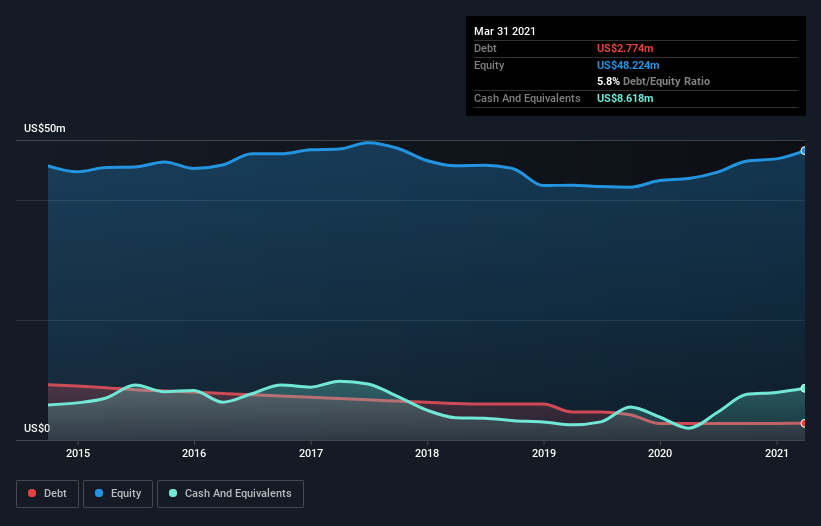Is Lifeway Foods (NASDAQ:LWAY) Using Too Much Debt?
The external fund manager backed by Berkshire Hathaway's Charlie Munger, Li Lu, makes no bones about it when he says 'The biggest investment risk is not the volatility of prices, but whether you will suffer a permanent loss of capital.' When we think about how risky a company is, we always like to look at its use of debt, since debt overload can lead to ruin. As with many other companies Lifeway Foods, Inc. (NASDAQ:LWAY) makes use of debt. But is this debt a concern to shareholders?
What Risk Does Debt Bring?
Generally speaking, debt only becomes a real problem when a company can't easily pay it off, either by raising capital or with its own cash flow. Ultimately, if the company can't fulfill its legal obligations to repay debt, shareholders could walk away with nothing. While that is not too common, we often do see indebted companies permanently diluting shareholders because lenders force them to raise capital at a distressed price. Of course, plenty of companies use debt to fund growth, without any negative consequences. The first step when considering a company's debt levels is to consider its cash and debt together.
Check out our latest analysis for Lifeway Foods
What Is Lifeway Foods's Net Debt?
As you can see below, Lifeway Foods had US$2.77m of debt, at March 2021, which is about the same as the year before. You can click the chart for greater detail. But on the other hand it also has US$8.62m in cash, leading to a US$5.84m net cash position.
A Look At Lifeway Foods' Liabilities
Zooming in on the latest balance sheet data, we can see that Lifeway Foods had liabilities of US$9.09m due within 12 months and liabilities of US$4.84m due beyond that. Offsetting these obligations, it had cash of US$8.62m as well as receivables valued at US$10.0m due within 12 months. So it actually has US$4.69m more liquid assets than total liabilities.
This surplus suggests that Lifeway Foods has a conservative balance sheet, and could probably eliminate its debt without much difficulty. Succinctly put, Lifeway Foods boasts net cash, so it's fair to say it does not have a heavy debt load!
It was also good to see that despite losing money on the EBIT line last year, Lifeway Foods turned things around in the last 12 months, delivering and EBIT of US$6.6m. There's no doubt that we learn most about debt from the balance sheet. But it is Lifeway Foods's earnings that will influence how the balance sheet holds up in the future. So if you're keen to discover more about its earnings, it might be worth checking out this graph of its long term earnings trend.
But our final consideration is also important, because a company cannot pay debt with paper profits; it needs cold hard cash. While Lifeway Foods has net cash on its balance sheet, it's still worth taking a look at its ability to convert earnings before interest and tax (EBIT) to free cash flow, to help us understand how quickly it is building (or eroding) that cash balance. Happily for any shareholders, Lifeway Foods actually produced more free cash flow than EBIT over the last year. That sort of strong cash conversion gets us as excited as the crowd when the beat drops at a Daft Punk concert.
Summing up
While it is always sensible to investigate a company's debt, in this case Lifeway Foods has US$5.84m in net cash and a decent-looking balance sheet. The cherry on top was that in converted 100% of that EBIT to free cash flow, bringing in US$6.6m. So is Lifeway Foods's debt a risk? It doesn't seem so to us. There's no doubt that we learn most about debt from the balance sheet. However, not all investment risk resides within the balance sheet - far from it. Be aware that Lifeway Foods is showing 3 warning signs in our investment analysis , and 1 of those doesn't sit too well with us...
At the end of the day, it's often better to focus on companies that are free from net debt. You can access our special list of such companies (all with a track record of profit growth). It's free.
This article by Simply Wall St is general in nature. It does not constitute a recommendation to buy or sell any stock, and does not take account of your objectives, or your financial situation. We aim to bring you long-term focused analysis driven by fundamental data. Note that our analysis may not factor in the latest price-sensitive company announcements or qualitative material. Simply Wall St has no position in any stocks mentioned.
Have feedback on this article? Concerned about the content? Get in touch with us directly. Alternatively, email editorial-team (at) simplywallst.com.

